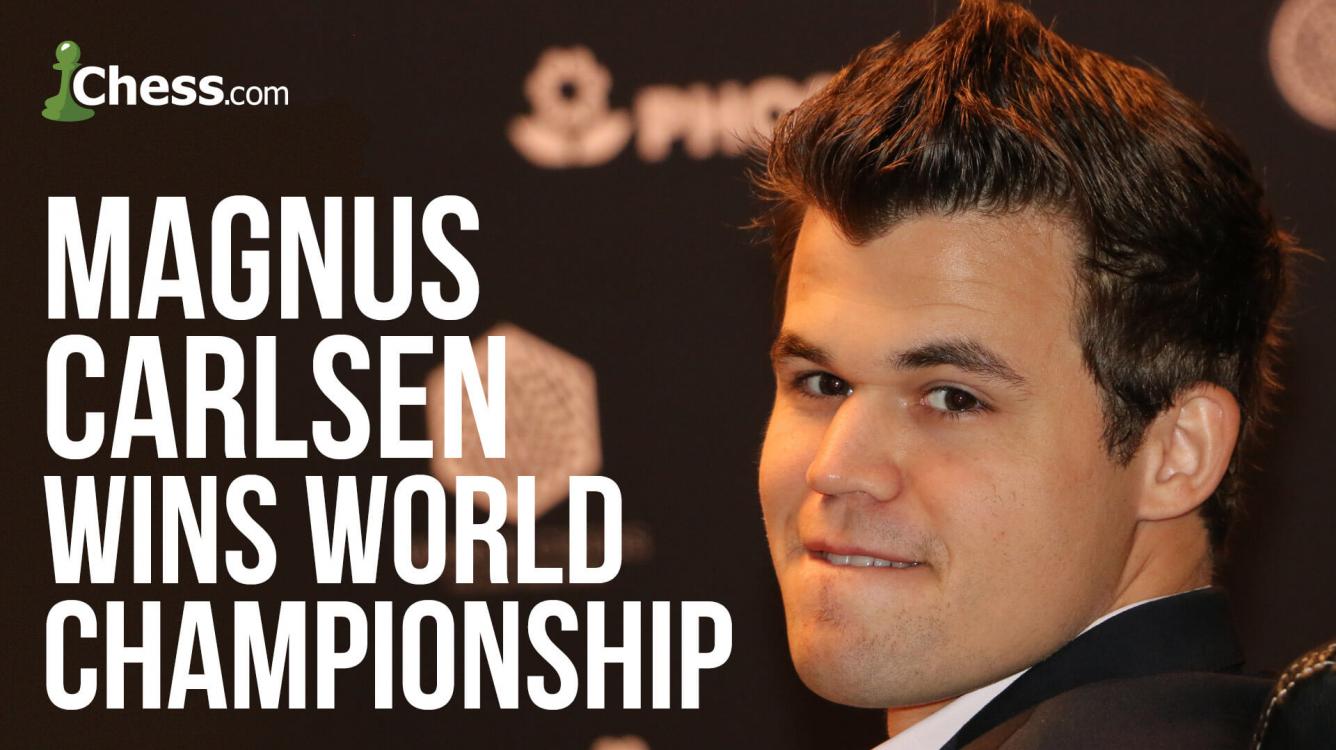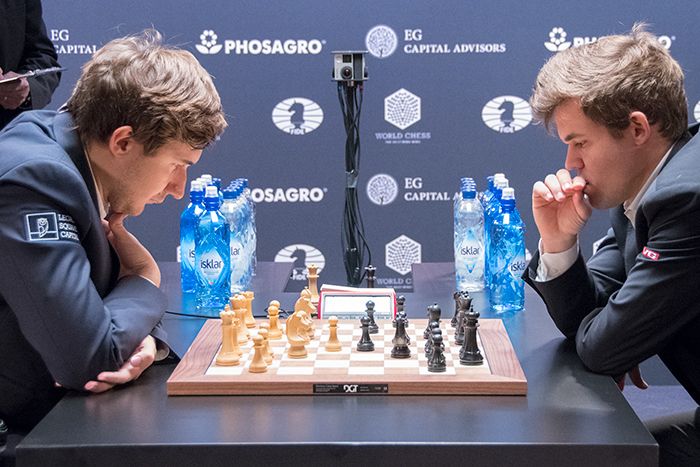
Carlsen Wins Rapid Playoff, Defends World Championship
It was about time.
Just like in the classical portion of the 2016 world championship, GM Magnus Carlsen got several promising positions against GM Sergey Karjakin in the rapid playoff.
The difference? Today Carlsen used an extra weapon: the clock. Ahead on time in every game, Carlsen was rarely under duress while Karjakin's hourglass was constantly running out of sand.
Just for fun, he ended the world championship with a queen sac, leading to multi-option forced mate.

If you don't count the style points, the final margin was 3-1. The crown would return home to Norway.
Fittingly, it was in classical games three and four that Carlsen spoiled big advantages. Today he won those same two rounds in the rapid.
Carlsen is not the world rapid champion for nothing. Besides always saving more time, he was also never in significant danger today. By winning the rapid, the three-week match in New York came to a close.
"If anyone thinks it's easy, it's time to get back to earth," Carlsen said at the closing ceremony.
The crowd sang "Happy Birthday" to him as he entered the common area, and Karjakin wished him the same.
-Sergey, can you please also comment?
— Anna Rudolf (@Anna_Chess) December 1, 2016
-Yeah, happy birthday Magnus! :)#FriendshipOverRivalry
Press conf #worldchess2016 #CarlsenKarjakin
Carlsen turned 26 today, the same age as his opponent in the youngest world championship ever.

Was the rapid ending to the world championship a proper method? The extremely interesting games two, three, and four will surely continue the debate for weeks to come.
The double champion didn't convert every chance, but in a match, only one is needed. After the 6-6 tie in regulation play, today Carlsen's game-three win produced the needed margin and his second successful title defense. Game four's beauty helped erase any of thoughts of his miss in game two.
"I think it was a wonderful fight," Carlsen said of the month of November. He confirmed in words what his banal play in Monday's round 12 suggested. Carlsen admitted that he played for the tiebreak after holding his last turn as Black.
"I pretty much knew this was going to happen when we made the draw in the 11th game," he said. "My strategy was to go for the tiebreak and try my luck there."

The players at the press conference.
Chess.com informed him that prior to today, he had an "only" an even score against Karjakin in rapid.
"I didn't actually know what my score against him was in rapid," Carlsen replied. "I felt that it was an advantage for me that I didn't have to think as much about game 12 and he did. And I felt my head was working better than it was [before]...Playing four games instead of one seemed like a very good idea. Besides, it was very refreshing to play a bit faster after all these weeks."
Karjakin took the match much longer than GM Viswanathan Anand could. In 2013, Carlsen needed 10 games to wrest the title, then in 2014, he needed 11 games to retain it. Both matches were against the former Indian champion.
Carlsen necessarily called it his toughest world championship test and compared it to the 2013 Candidates' Tournament "where I barely got through."
Today after a mostly equal opener, round two produced a massive opportunity for Carlsen, who could not convert despite several winning moves. Karjakin was universally lauded for defending a worse position for 84 moves, many of them with less than 10 seconds on his clock.
The challenger found a multi-move drawing combination, fantastically sacrificing all three remaining pawns and his rook! Pundits were once again mystified how Carlsen could fail at yet another conversion.
"I would shoot myself in Magnus's place," commentator GM Judit Polgar said.

Spike Lee said, "It's gotta be the shoes," but for the basketball-obsessed Carlsen, today it was all about the socks. They featured the NBA logo. "It was the end of the tournament, and socks are often not the main priority," Carlsen said. "At the end of the tournament, they can be scarce."
The Russian's successful defense was a Pyrrhic victory, as Karjakin's manager admitted later. Kiril Zangalis said that Karjakin could not be expected to keep up such resistance.
It wasn't just the last 50 minutes he had to suffer; it was the hours that Carlsen had him on the ropes in classical.
After only a few minutes of break, Carlsen came back to the board looking stern. He used the same strategy as in the previous rapid game: get ahead on the clock and offer a pawn for active play. The big difference? The Norwegian kept the queens on the board, and Karjakin finally made his first catastrophic error in New York.
Now that was epic. The game many have been waiting for @MagnusCarlsen to have. Crushing victory with Black. #CarlsenKarjakin #worldchess2016
— Daniel Rensch (@DanielRensch) November 30, 2016
The good knight-versus-bad-bishop middlegame looked primed for 40 more moves of cat-and-mouse. But this time Karjakin ran his clock below five seconds, then ran right into the Norwegian's claws with 38. Rxc7.
Game three analysis By GM Robert Hess:
In game four, Karjakin was thus behind for the first time all match. Unlike Carlsen after game eight, Karjakin had only one chance to even the score in the tiebreaks.
After 10 Ruy Lopez games in total, we had our first Sicilian. Necessity does breed invention, but it's not the opening people will remember. The finale was so eloquent that it helped Carlsen reverse the negative thoughts he had from earlier in the title defense.
"After game eight I had all sorts of negative thoughts in my head," Carlsen said. "It was very difficult to settle down and play normally...I'm very happy that at the end of the match I found joy in playing. To some extent that's the most important thing. I was in a dark place in this match."
Game four analysis by GM Robert Hess:
For his part, Karjakin said he suffered from the transition to rapid, and perhaps over-preparation.
"I really played badly today," he said. "To play rapid games after 12 rounds of classical chess, somehow I didn't manage to make it work. I know that I can play better in rapid chess, but not this time.
"[Carlsen] was jumping to some different openings. I didn't really use my preparation. A few times I completely forgot my preparation. There were so many things to prepare that I didn't manage to remember everything. Maybe it was better to have a fresh head. Maybe that was my mistake before the rapid games. In rapid chess it's just better to be in good shape and I wasn't."
Congratulations to Magnus! His lack of preparation angered the goddess Caissa, but not enough to drive her into the drab Karjakin's arms.
— Garry Kasparov (@Kasparov63) December 1, 2016

Carlsen raises the championship trophy.
Karjakin said he was so immersed in chess that he doesn't know many other events from the last three weeks.
"I'm going to ask my wife what actually has happened," he said. Later, he said that fatherly milestones are waiting for him -- his son is currently taking his first steps.
Prior to dropping rapid games three and four, Karjakin was the one being lauded for his impressive play in the rapid. Well, not the usual form of impressive, but rather his own inimitable style: staunch defense. With Carlsen finding a nifty pawn sacrifice to force through a dangerous passer, Karjakin ate up much of his remaining time but found a crafty idea.
The challenger offered two minors for a rook, but importantly ridded himself of the menacing pawn and he could now focus on just one wing. With his own time dwindling, Carlsen didn't play the sparkling 37. Ng5 or various other prosaic wins later, allowing the Russian to find a diabolical way to draw. Karjakin gave up all four of his remaining pieces, three pawns and a rook, to stalemate himself!
Game two analysis by GM Robert Hess:
"The second game was a bit frustrating," Carlsen said. The qualifier "a bit" might not have been included were it not for the final result of the playoff.
Those three exciting battles followed round one, which was more like two strangers exchanging pleasantries at the bus stop before the workday began.
Game one analysis by GM Robert Hess:
Where do the players go from here? Well, they both plan to play the World Rapid and Blitz Championships in Qatar in December. But on a more long-term level, Karjakin said he will fight again for the top honor in chess. Not surprisingly, he plans to accept his invitation to the next Candidates' Tournament.
"I'm very ambitious," he said. "I believe I will have another match. I don't know which year but I'm sure my career will be long enough."
Carlsen said he's eager to work on at least one facet of his game. He said he would like to recover better mentally after hardships. He stopped doing yoga, but said that relying on results to turn around his disposition was not the best strategy.

Magnus Carlsen, world champion for at least another two years.
The tournament structure was also discussed. Agon director Ilya Merenzon shared some impressive statistics: More than 10 million viewers watched the official website (90 percent on smartphones); more than 10,000 watched in person (possibly a record, he's checking on Chennai 2013); and more than 400 accredited media covered the match.
As for the match system, Carlsen repeated his desire for another format, which likely means his 2015 comments that he prefers an annual knockout. Karjakin did not agree.
"I think the system is fine," he said. "It's very fair and it works. The only thing I'd like to change as a chess professional would be if the prize fund is increasing."
Since the match went to a playoff, Carlsen won 55 percent of the prize fund, or 550,000 Euros, while Karjakin won 45 percent, or 450,000 Euros.

Karjakin finished with a smile. He mentioned that he had just heard from his wife that his son made his first steps.
Merenzon's comments suggested the overall format will not change in 2018. In fact, the schedule won't either. He's reserved the exact same dates for the next world championship in two years. (Americans: Thanksgiving that year is November 22, which according to this year's schedule was a rest day.)
Merenzon's focus is on the branding and the entertainment, not the format, which is mostly FIDE-controlled.
"It's a little bit like going to church," Merenzon said. "Traditions are 1,000 years long. Changes have to be a little bit gradual."

Carlsen closed his eyes during the Norwegian national anthem and would later thank everyone involved, giving much attention to his father — he expressed his "eternal gratitude" to him.
Peter Doggers contributed to this report.

